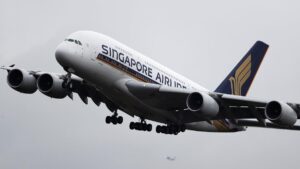The Trump administration has announced a new set of sanctions aimed at dismantling Iran’s extensive shadow oil network, identifying various entities and individuals across multiple countries, including an India-based shipping firm and a petroleum products trader. This initiative is part of efforts to heighten financial pressures on Tehran’s military operations.
According to a statement from the U.S. Department of State, “Today, the Department of State is designating 17 entities, individuals, and vessels to stem the flow of revenue that the Iranian regime uses to advance its nuclear program and to enable shipping facilitators in multiple jurisdictions who, through obfuscation and deception, load and transport Iranian oil for sale to buyers.”
Additionally, the Department of the Treasury is targeting further shipping networks involved in illicit oil transactions that fund the Iranian regime, as well as an airline and associated affiliates supplying arms to Iran-backed terrorist groups. The U.S. government emphasizes that the Iranian regime continues to exacerbate conflicts in the Middle East while funding its nuclear escalations and supporting terrorist factions. “The United States will continue to act against the network of maritime service providers, dark fleet operators, and petroleum products traders involved in the transport of Iranian crude oil and petroleum products,” the statement adds.
Among the newly sanctioned entities is TR6 PETRO, an India-based petroleum products trader accused of importing over $8 million worth of Iranian-origin bitumen between October 2024 and June 2025. The U.S. Department of State stated that TR6 PETRO is designated under Section 3(a)(ii) of E.O. 13846 for knowingly engaging in significant transactions involving Iranian petroleum products.
The sanctions, issued by the Office of Foreign Assets Control (OFAC), specifically target a network of front companies, shipping handlers, and logistical intermediaries allegedly used by Iranian military-linked entities to facilitate the movement of billions of dollars’ worth of crude oil. The U.S. Department of Treasury pointed out that these oil revenues have become essential for Iran’s armed forces, which are reportedly recovering after a recent conflict known as the 12-Day War with Israel.
Treasury Secretary Scott Bessent commented, “Today’s action continues Treasury’s campaign to cut off funding for the Iranian regime’s development of nuclear weapons and support of terrorist proxies,” adding that disrupting Iran’s revenue streams is vital to curb its nuclear ambitions.
Also named in the sanctions is RN Ship Management Private Limited, indicated as an India-based operator managing vessels that transport Iranian crude on behalf of Sepehr Energy Jahan Nama Pars Company, already sanctioned for its ties to Iran’s military. Two individuals, Zair Husain Iqbal Husain Sayed and Zulfikar Hussain Rizvi Sayed, associated with the firm, have also been sanctioned.
RN Ship Management is reportedly part of a broader network of companies from various countries, including the UAE, Panama, Germany, Greece, and The Gambia, cited for their involvement in facilitating Iranian military-related oil shipments. OFAC also listed several tankers believed to have transported significant quantities of Iranian crude through covert ship-to-ship transfers, often performed by vessels that disable tracking systems or alter documentation to obscure cargo origins.
The Treasury explained that Sepehr Energy Jahan utilizes an extensive international network of brokers and intermediaries to disguise Iranian oil and continue its operations despite existing sanctions. The new measures also extend restrictions on Mahan Air, Iran’s largest private airline, and its subsidiary Yazd International Airways Company, with accusations of coordinating closely with the Islamic Revolutionary Guard Corps-Qods Force, allegedly transporting personnel and weapons to support Iran-backed groups in Syria and Lebanon.
Multiple aircraft operated by Mahan Air have been identified as blocked property, and sanctions have been placed on senior officials involved in the airline’s procurement and logistics operations. The recent penalties fall under Executive Orders 13224 and 13902, targeting supporters of terrorism and those involved in Iran’s petroleum sector.
OFAC reiterated that the intent of these sanctions is “not to punish, but to bring about a positive change in behavior,” although violations can lead to significant civil or criminal penalties. All properties belonging to the designated entities and individuals within U.S. jurisdiction are frozen, and American citizens are prohibited from engaging in any transactions with them.
Published on November 21, 2025.










